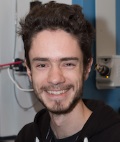Thierry Schmidlin |
2024-04-18 |
 |
Thierry Schmidlin,M.Sc. studied Biology at ETH Zurich (Switzerland) obtaining a M.Sc. in 2013. During his master thesis under supervision of Prof. Ruedi Aebersold, he started to learn Selected Reaction Monitoring focusing on phosphorylation events linked to autophagy in yeast. Since 2013, Thierry has been working as a Ph.D. student at Utrecht University (The Netherlands) under the joint supervision of Dr. Maarten Altelaar and Prof. Albert Heck. The main focus of his research is method development in SRM, MRM3 and DIA to study disease related signaling by or protein phosphorylation or endogenous peptides
Extending Selected Reaction Monitoring to Monitor Diet-Induced Neuropeptide SignalingThe analysis of neuropeptides has moved into focus in recent years, as their regulation is key in understanding a variety of functional processes, such as energy balance, drug addiction, etc. Read MoreThe biosynthesis of neuropeptides involves multiple trimming steps and post translational modification, thus impeding the prediction of the active peptide from the genome sequence or even the precursor protein. Therefore we believe that the analysis of undigested neuropeptides by a reproducible and robust method such as SRM is vital to accurately quantify the biologically active compounds. In a proof of principle study we quantified 15 neuropeptides in a rat obesity model using Skyline to perform assay development and optimization. We could show, that despite common practice precursor and fragment charges of up to 5 and 3 respectively do not limit the quality of the SRM peak groups, however require a dedicated individual optimization of the collision energies.
[PDF] |